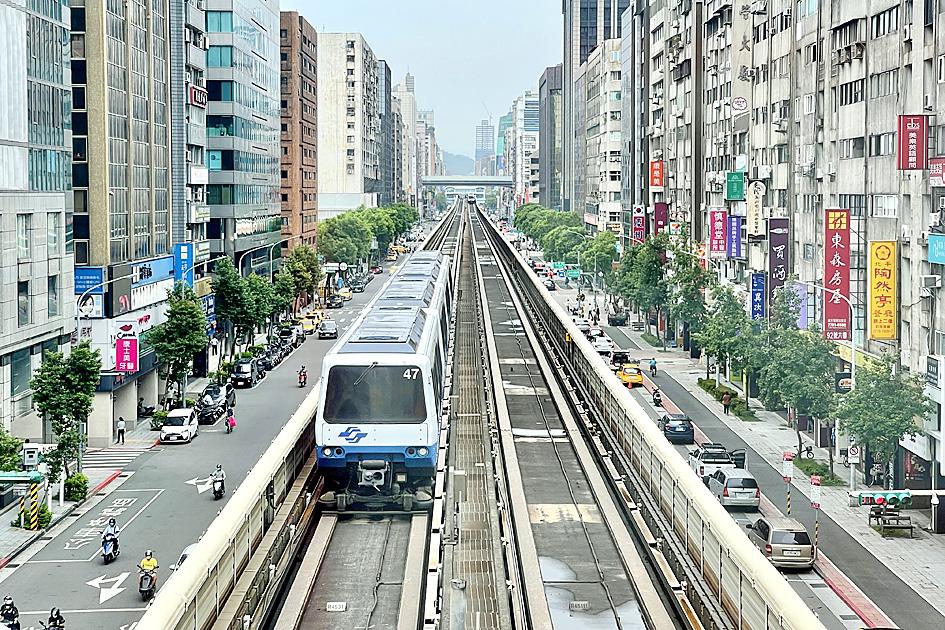Services on all Taipei MRT metropolitan railway system lines except the Wenshan-Neihu (Brown) Line were reduced starting yesterday amid a steep drop in passenger numbers due to COVID-19, the Taipei Rapid Transit Corp (TRTC) announced on Sunday.
Average wait times during off-peak weekday hours — those outside the 7am to 9am and 5pm to 7:30pm time periods — on the Tamsui-Xinyi (Red), Bannan (Blue) and Zhonghe-Xinlu (Orange) lines have increased by between 15 and 30 seconds, TRTC said.
Train frequency during these times on the Songshan-Xindian (Green) Line has been reduced from one every five to seven minutes to one every six to eight minutes, and from every nine to 10 minutes for the Circular (Yellow) line.

Photo: George Tsorng, Taipei Times
On weekends and public holidays, train frequency before 10am and after 8pm has been reduced from one every 4 minutes and 45 seconds to one every nine minutes and 30 seconds on the Red and Blue lines.
Train frequency on the Yellow Line over the weekend and public holidays has been cut from every nine minutes to every 10 minutes.
TRTC said that service frequency on all other lines during these times would remain unchanged, and that more trains might be added in the event of a larger-than-expected increase in passengers.
In light of rising local COVID-19 infections, the company also asked passengers to social distance while riding the trains and to wear a mask at all times.
Taipei’s MRT carried about 1.3 million commuters in the first week of the month, which fell to 1.2 million in the second week and 1.15 million by the third week, TRTC data showed.

Taiwan has received more than US$70 million in royalties as of the end of last year from developing the F-16V jet as countries worldwide purchase or upgrade to this popular model, government and military officials said on Saturday. Taiwan funded the development of the F-16V jet and ended up the sole investor as other countries withdrew from the program. Now the F-16V is increasingly popular and countries must pay Taiwan a percentage in royalties when they purchase new F-16V aircraft or upgrade older F-16 models. The next five years are expected to be the peak for these royalties, with Taiwan potentially earning

STAY IN YOUR LANE: As the US and Israel attack Iran, the ministry has warned China not to overstep by including Taiwanese citizens in its evacuation orders The Ministry of Foreign Affairs (MOFA) yesterday rebuked a statement by China’s embassy in Israel that it would evacuate Taiwanese holders of Chinese travel documents from Israel amid the latter’s escalating conflict with Iran. Tensions have risen across the Middle East in the wake of US and Israeli airstrikes on Iran beginning Saturday. China subsequently issued an evacuation notice for its citizens. In a news release, the Chinese embassy in Israel said holders of “Taiwan compatriot permits (台胞證)” issued to Taiwanese nationals by Chinese authorities for travel to China — could register for evacuation to Egypt. In Taipei, the ministry yesterday said Taiwan

Taiwan is awaiting official notification from the US regarding the status of the Agreement on Reciprocal Trade (ART) after the US Supreme Court ruled US President Donald Trump's global tariffs unconstitutional. Speaking to reporters before a legislative hearing today, Premier Cho Jung-tai (卓榮泰) said that Taiwan's negotiation team remains focused on ensuring that the bilateral trade deal remains intact despite the legal challenge to Trump's tariff policy. "The US has pledged to notify its trade partners once the subsequent administrative and legal processes are finalized, and that certainly includes Taiwan," Cho said when asked about opposition parties’ doubts that the ART was

If China chose to invade Taiwan tomorrow, it would only have to sever three undersea fiber-optic cable clusters to cause a data blackout, Jason Hsu (許毓仁), a senior fellow at the Hudson Institute and former Chinese Nationalist Party (KMT) legislator, told a US security panel yesterday. In a Taiwan contingency, cable disruption would be one of the earliest preinvasion actions and the signal that escalation had begun, he said, adding that Taiwan’s current cable repair capabilities are insufficient. The US-China Economic and Security Review Commission (USCC) yesterday held a hearing on US-China Competition Under the Sea, with Hsu speaking on